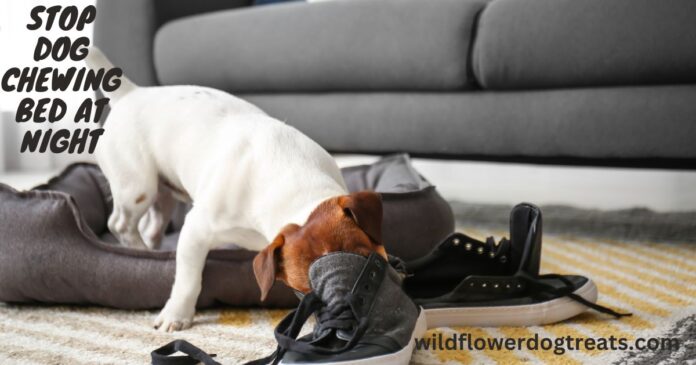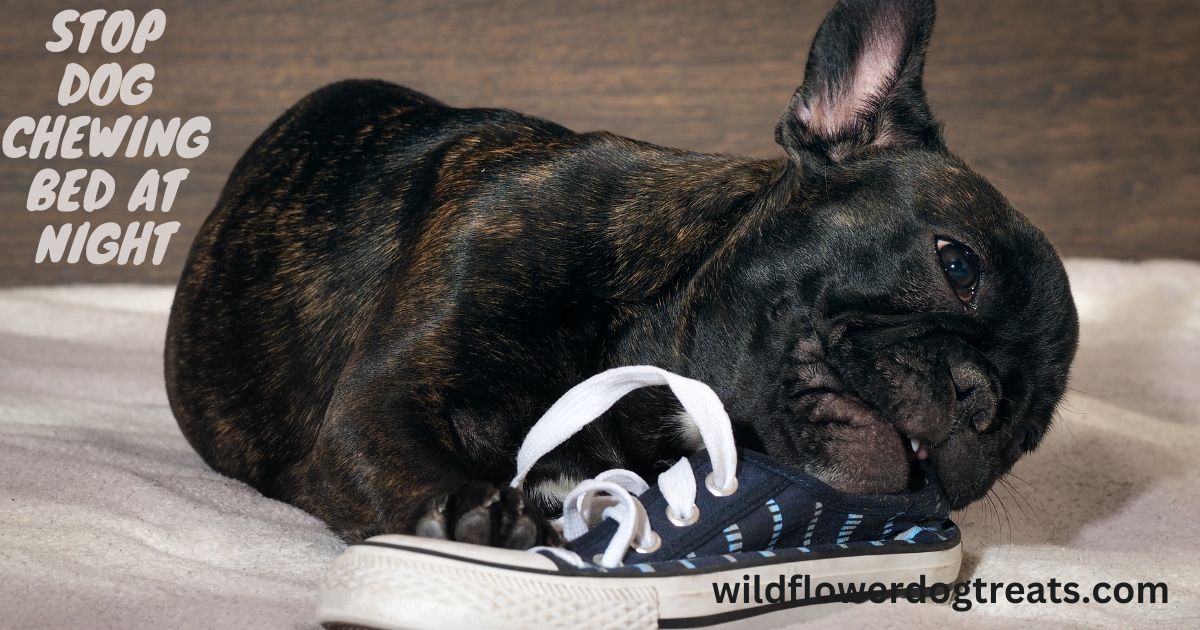To stop your dog from chewing his bed at night, provide enough mental and physical exercise during the day and offer chew toys or treats at bedtime. This will alleviate boredom and reduce the urge to chew on the bed.
Dog chewing behavior at night can be frustrating for pet owners. However, understanding the underlying reasons and implementing positive reinforcement techniques can help address this issue effectively. We will explore common reasons why dogs chew their beds at night, the potential risks associated with this behavior, and practical strategies to modify their behavior.
By adhering to these recommendations, you can effectively stop your dog from chewing his bed and ensure peaceful nights for both you and your pet.
Understanding The Root Cause
Understanding why your dog is chewing his bed at night is a crucial step in addressing this behavior. By exploring the root cause, you can effectively implement strategies to stop this destructive habit and ensure your dog’s well-being.
Canine Behavior And Chewing Instinct
Canine behavior is complex and encompasses various instincts and habits. Dogs are natural chewers, and this behavior is rooted in their evolutionary history as predators. Chewing serves as a means for them to explore their environment, alleviate boredom, and relieve anxiety. It’s essential to acknowledge that this behavior is often instinctual and not simply a result of disobedience.
Natural Instincts Of Dogs
Dogs have natural instincts that drive their behaviors. Chewing is a way for them to maintain their dental health by keeping their teeth clean and strong. Additionally, it also helps to relieve the teething discomfort in puppies. Understanding these innate instincts can provide insight into why your dog is chewing his bed at night.
Reasons For Chewing Behavior
There are several reasons why dogs exhibit chewing behavior. It could be due to stress, separation anxiety, or inadequate physical and mental stimulation. Identifying the specific reason for your dog’s chewing habit is integral to finding a suitable solution. By understanding the root cause, you can proactively address the behavior and help your dog lead a healthier, happier life.
Identifying Trigger Factors
Environmental Stressors
Dogs are affected by their environment, and stressors can contribute to destructive behavior, such as chewing their bed at night. Common environmental stressors include loud noises, new surroundings, or uncomfortable temperatures.
Separation Anxiety
Dogs that suffer from separation anxiety may exhibit destructive behaviors, including chewing their bed at night. Symptoms of separation anxiety can include excessive barking, howling, and pacing when left alone.
Boredom And Lack Of Mental Stimulation
When dogs are bored and lack mental stimulation, they may resort to chewing their bed as a form of entertainment or to alleviate their boredom. Providing interactive toys and engaging activities can help combat boredom and reduce destructive behavior.
Effective Training Methods
Effective training methods are essential when it comes to teaching your dog to stop chewing his bed at night. By using positive reinforcement techniques, reward-based training, and redirecting chewing behavior, you can effectively address this behavior. These methods focus on encouraging desirable behavior while discouraging destructive habits. Let’s explore these training methods in more detail.
Positive Reinforcement Techniques
Positive reinforcement involves rewarding your dog for exhibiting the desired behavior. When your dog abstains from chewing his bed at night, praise him and offer treats as a reward. This positive experience will encourage him to repeat the behavior, helping to eliminate the bedtime chewing habit. Consistency is key in reinforcing positive behavior, so be sure to reward your dog every time he refrains from chewing his bed.
Reward-based Training
Incorporating reward-based training can be an effective way to deter your dog from chewing his bed at night. By associating the cessation of chewing with positive outcomes, such as playtime, affection, or additional treats, your dog will learn to view refraining from chewing as a pleasurable and beneficial act. This approach not only aids in eliminating the chewing behavior but also strengthens the bond between you and your dog.
Redirecting Chewing Behavior
Redirecting your dog’s chewing behavior involves providing him with appropriate items to chew on instead of his bed. Offer chew toys, rawhide, or bully sticks, and encourage him to engage with these items. When he chooses to chew on the designated items, offer praise and rewards to reinforce the positive behavior. This strategy helps to satisfy your dog’s natural urge to chew while preserving his bed.
Establishing A Bedtime Routine
One of the most effective ways to stop your dog from chewing his bed at night is to establish a consistent and calming bedtime routine. Dogs thrive on routine, and by creating a predictable and soothing evening ritual, you can help your furry friend relax and prepare for sleep, reducing the likelihood of destructive behavior such as chewing.
Enriching Bedtime Activities
Engage your dog in enriching bedtime activities, such as a peaceful walk in the evening or spending quality time together. This not only helps to burn off excess energy but also provides mental stimulation, making it easier for your dog to settle down for the night.
Interactive Playtime
Incorporate interactive playtime into your evening routine. Playing with your dog using interactive toys or engaging in gentle training activities can help channel your dog’s energy into positive outlets, preventing destructive behaviors like chewing.
Mental Stimulation Toys
Provide your dog with mental stimulation toys designed to keep them mentally engaged and entertained. Chew toys, puzzle feeders, and interactive toys can offer a healthy outlet for your dog’s natural chewing instincts, reducing the likelihood of them targeting their bed during the night.
Creating A Comfortable Sleeping Environment
Your dog’s bed should be a place of comfort, security, and relaxation. By creating a comfortable sleeping environment, you can help discourage your dog from chewing on their bed at night. Providing the right bedding materials and options is key to ensuring your dog enjoys a peaceful night’s sleep without resorting to destructive behavior.
Selecting Chew-resistant Bedding
Choosing chew-resistant bedding is essential to prevent your dog from destroying their bed. Look for tough, durable materials such as nylon or denim that can withstand your dog’s chewing habits. Waterproof materials can also be beneficial in case of accidents.
Durable And Indestructible Bed Options
When selecting a bed for your dog, opt for indestructible options that are specifically designed for chewers. Beds made from heavy-duty canvas or reinforced fabrics are often more resilient to chewing and can withstand more wear and tear.
Safe Fabric And Material Choices
Ensure that the bed is made from non-toxic and safe materials as some fabric treatments or fillings can be harmful to your dog if ingested. Look for hypoallergenic and natural fabrics to reduce the risk of any adverse reactions or sensitivities.
Dog-safe Chewing Alternatives
Dogs have a natural instinct to chew, which can lead to destructive behavior if not managed properly. Providing dog-safe chewing alternatives can help redirect this behavior and protect your dog’s bed from being chewed at night.
Interactive Chew Toys
Interactive chew toys engage your dog’s mind and body, keeping them entertained and less likely to resort to destructive chewing. Look for toys that are durable and designed to withstand heavy chewing. Regularly rotating the toys can help maintain your dog’s interest and prevent boredom.
Teething Toys And Dental Chews
Dogs may chew excessively if they are teething or need to satisfy their natural urge to gnaw. Teething toys specifically designed for puppies or softer dental chews for adult dogs can provide relief and promote dental health while discouraging destructive chewing.
Frozen Treats And Food Puzzles
Using frozen treats in a chew toy or food puzzle can provide hours of entertainment and mental stimulation for your dog. These activities not only distract from destructive chewing but also encourage problem-solving skills and offer a tasty reward.
Frequently Asked Questions Of How To Stop My Dog Chewing His Bed At Night
How Can I Stop My Dog From Chewing His Bed At Night?
To prevent your dog from chewing his bed at night, provide enough mental and physical stimulation during the day. Choose a chew-resistant bed and discourage the behavior with positive reinforcement and deterrent sprays. Ensure your dog’s dental health is good, and consider consulting a vet for any underlying issues.
What Are Some Safe Chew Toys For Dogs?
Safe chew toys for dogs include durable rubber toys, rope toys, and interactive puzzle toys. Ensure the toys are appropriate for your dog’s size and chewing strength, and regularly inspect them for wear and tear. Avoid toys with small parts that could be swallowed, and always supervise your dog during playtime.
Why Do Dogs Chew Their Beds At Night?
Dogs may chew their beds at night due to boredom, anxiety, teething, or medical issues. Chewing provides comfort and stress relief for some dogs. Understanding the root cause can help address the behavior through proper training, mental and physical stimulation, and addressing any underlying health concerns.
Conclusion
Addressing your dog’s nighttime bed chewing behavior requires patience, consistency, and understanding. By implementing positive reinforcement, sufficient exercise, and providing appropriate chew toys, you can discourage this habit and create a comfortable bedtime routine for your furry friend. Understanding your dog’s needs and acting accordingly is key to achieving a peaceful night’s sleep for both you and your pet.




